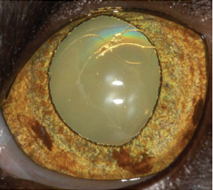Feline Iris Melanosis
Iris melanosis is a pigment change to the iris specific to felines. The pigment is a result of melanocytes, or pigmented cells, inappropriately replicating and spreading over the iris’ surface. Iris melanosis is benign, but it can transform into malignant cancer. Close monitoring by an ophthalmologist is recommended to catch early changes in the disease that could potentially be fatal for the eye.
It is common to first notice pigment as a small, flat, and benign nevus, or “freckle” on the iris. Benign iris pigment is termed “iris melanosis”, and can stay as such for several years, but does have the potential to spread at any point. Increasing pigment across the iris can lead to secondary ocular complications (glaucoma and retinal detachments). More importantly, if the spreading melanocytes become aggressive in nature, they transform into cancerous or malignant cells. The condition is then termed “malignant melanoma or iris melanoma”. If malignant, the cells can spread to other areas of the body (e.g. lungs and liver) and be fatal.
Much research has been done on the disease, but we do not yet have a way to definitively identify when benign iris melanosis is on the verge of transformation into malignant melanoma. Most ophthalmologists do, however, consider the following changes to be “clues” that the pigment is becoming dangerous: rapid pigment increase or thickening and pigment growth to the edge of the iris. If these signs are noted, an enucleation (eye removal) may be recommended by your ophthalmologist. Despite the tough decision and controversy, eye removal will prevent the chance of melanoma metastasizing elsewhere in the body. The enucleated eye will also be sent to a pathologist to determine a definitive diagnosis and plan Some ophthalmologists recommend laser therapy – targeted destruction of the iris melanosis – in early stages of the condition. The goal of this therapy is to prevent or delay the transformation of iris melanosis into malignant melanoma. Though many ophthalmologists think laser therapy can be helpful, it has not yet been proven by a large-scale scientific study.
Each case of iris melanosis is different. Your veterinarian and veterinary ophthalmologist can help you decide what treatment approach is appropriate for your pet.


